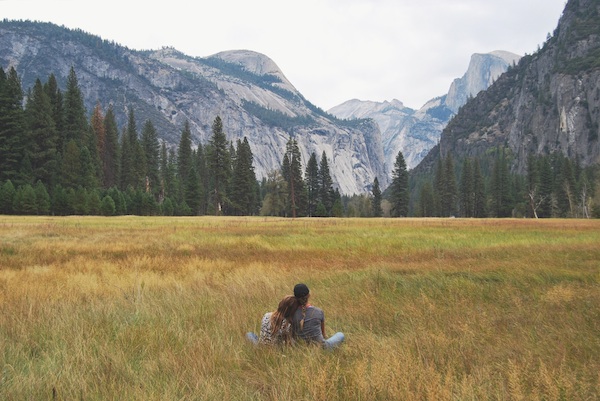I was 18 years old when we met.
He was living in a canvas tent. I was staying in a friend’s tipi across the meadow.
We went on a road trip one weekend, and when we returned we both called the canvas tent home.
We have lived together ever since.
That was 20 years ago this summer.
We have never married, but we have the same last name.
We have brought two children into the world, built our own home and traveled the world, and still it often feels like we are just getting to know each other.
Here are some of the things I have learned so far on this journey of sharing my life with another human:
1) You Can Never Really Know What Goes On For Another Person.
You would think after 20 years we would know what makes the other tick, and of course, in some ways we do. But amazingly, mostly we don’t. What my life partner thinks about during the day, what inspires him, what he wants to do for the next 20 years—I have to admit that this is still mostly a mystery for me.
And I am fully aware that he can barely figure out what I would like to have for lunch on a given day.
The Lesson: The only person’s inner world we can experience is our own.
Anything else needs to be communicated, and still it can be hard to understand another person. Sometimes I think we just have to let go of this need to understand anyone, even ourselves, and just commit to bringing as much truth, love and authenticity as we can to our experiences
2) Unconditional Love is Much Harder Than It Sounds.
When we share a life with another person, their choices and actions have an incredibly strong impact on our own lives. This is hard. We want to give our whole hearts to the person we have chosen to be our mate, but we also want to be comfortable. When we feel let down, don’t have our needs met or are inconvenienced by our mate, the pain is like a filter on our unconditional love. We love the other person, but we also have wants and needs, and these can get in the way of simply sending love.
The Lesson: We need to be gentle with ourselves when it comes to the process of unconditional love. We need to have boundaries and space for our own truth. Unconditional love is not being a martyr.
Unconditional love is walking through each moment knowing we are all trying our best.
3) We Are Not One Entity.
My partner’s choices do not reflect on me, and mine don’t reflect on him. This has been a hard one for me to learn—perhaps I am still learning it.
For years I knew I was too hard on him—but I was much worse to myself. It was like he was an extension of me, and through nagging and trying to control him I could feel safer, better and happier. However, disentangling the enmeshment of feeling like our goals and lives are the same thing has made us both happier.
The Lesson: We are each individuals, with our own ambitions, and own temperament styles. This isn’t just allowed; it is valued.
When we each have space to pursue our lives through our own personal styles, without criticism, we enjoy each other’s company much more. We aren’t meant to be the same; rather, we are meant to benefit from our differences.
4) We Don’t Need to Be Soul Mates.
When I was 18 years old, I wanted everything to be a spiritual experience. I read articles about couples synching their breathing so their telepathic connection would be stronger. I thought my intimate relationship had to be on the spiritual plane at all times.
However, as I’ve matured, I have seen that we are all on soul journeys all the time.
The Lesson: Sharing finances, domestic duties and parenting with another person might seem mundane, but it is actually an advanced spiritual practice. It requires communication, honesty and a shared set of values, in my experience.
Keeping up with the earthly requirements of being human is spiritual—not in a heightened sensual way of feeling certain you are living with your soul mate, but instead in a grounded, earth-connected manner of being responsible to another being on this human journey.
5) Everything Changes.
The shapes of our bodies. Our opinions. Our interests. Our sense of self. Our needs. Our wants. They change. They change for us, and they change for our partners.
Being open to change is one of the best ways to sustain all of our relationships. Being willing to show up for the freshness of who we are now—not who we were in the past, or who we thought we might be in the future, but who we actually are now—is an incredibly refreshing way to live.
The Lesson: We need to love our body and mind, and our partner’s body and mind, as it is today. Not as it was in the past, and not as it might be in the future, but as it is right this second. This is the work.
Sometimes we just don’t love it at all, though. Anyone who has spent time with themselves or with another person knows this. But since we know everything changes, we know we can bring love and patience to the experience and not loving how things are as well, and continue on together fumbling through our life path. Together.
This is what me and my love have been doing for 20 years, and what we plan to do for at least 20 years more.
~
Relephant Read:
How to Get Better at All our Relationships.
~
Author: Ruth Lera
Editor: Toby Israel
Image: Anneliese Phillips/Unsplash // Abigail Keenster/Unsplash
~







Read 4 comments and reply